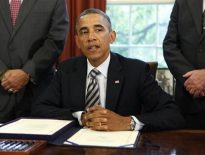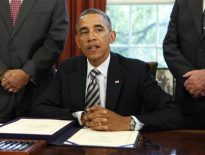(Reuters) – The gunman who killed six worshipers at a Sikh temple in Wisconsin was identified as a 40-year-old U.S. Army veteran and authorities said they were investigating possible links to white supremacist groups and his membership in skinhead rock bands.

The assailant, shot dead by police at the scene on Sunday, was identified as Wade Michael Page. He served as a soldier in the Army from 1992 to 1998, police chief John Edwards said in the Milwaukee suburb of Oak Creek where the 400-member temple is located.
Survivors described women and children hiding in the pantry of the temple’s community kitchen as the gunman stormed through the building. “Everyone was falling on top of one another,” said Parminder Toor, 54, speaking in Punjabi as her daughter-in-law, Jaskiran Kaur, translated.
“It was dark and we were all crammed in.” One of the women who made it into the pantry had been shot in the hand, and there was “blood everywhere,” said Toor.
Federal authorities said they were treating the attack as a possible act of domestic terrorism.
According to the Southern Poverty Law Center, which tracks hate groups, Page was a member of two racist bands named End Apathy and Definite Hate, “a band whose album ‘Violent Victory’ featured a gruesome drawing of a disembodied white arm punching a black man in the face.”
A MySpace page for a band that appears to be one of those identified by the SPLC, End Apathy, includes songs with titles such as “Self Destruct,” “Submission” and “Insignificant,” as well as pictures of three heavily tattooed band members.
“The music is a sad commentary on our sick society and the problems that prevent true progress,” the band’s profile says.
Band T-shirts advertized on the page include one with the Roman numeral 14 — a number the SPLC said was a reference to the 14-word white supremacist slogan “We must secure the existence of our people and a future for white children.”
A YouTube video posted in 2009 of a song by Definite Hate, which appears to have been another Page band, shows a scroll of the lyrics that includes: “Wake Up, White man, For Your Race, And your land,” and “Wake Up People Or Your Gonna Die!”
The SPLC pointed to a 2010 interview with white supremacist website Label 56 in which Page said he had played in various bands since 2000, when he left his native Colorado on a motorcycle.
Two years earlier, in 1998, Page had been discharged from the Army for “patterns of misconduct,” according to military sources. He had served for six years but was never posted overseas. He was a psychological operations specialist and missile repairman who was last stationed at Fort Bragg, North Carolina, the sources said.
In June 1998 he was disciplined for being drunk on duty and had his rank reduced to specialist from sergeant. He was not eligible to re-enlist.
In recent months, Page moved to a suburb of Milwaukee called Cudahy. Peter Hoyt, who lives nearby, said he would often see Page sitting on his porch or walking the neighborhood.
Page talked about an ex-girlfriend who had broken up with him or, sometimes, the Green Bay Packers. “He was friendly with me,” Hoyt said. “When I found out it was him, I was astounded.”
LONE GUNMAN
FBI special agent Teresa Carlson said authorities were interviewing Page’s family and associates searching for a motive behind the shooting that killed six people and seriously wounded three, including a police officer, at the Sikh Temple of Wisconsin.
A fourth person was wounded less seriously.
The dead were five men and one woman, aged between 39 and 84, including the president of the congregation and a priest.
Hundreds of people converged on a Sikh temple in Brookfield, Wisconsin on Monday evening for a vigil to mourn the dead. Those attending with uncovered heads, including Wisconsin Governor Scott Walker, were required to cover them with predominantly orange headscarves knotted at the back.
American Sikhs around the country added security to temples, with some saying they have been singled out for harassment since the September 11, 2001, attacks because they are mistaken as Muslims due to their colorful turbans and beards.
Describing how the events unfolded, Chief Edwards told reporters the first officer on the scene found a victim in the temple parking lot and went to render assistance. The officer was then shot eight or nine times at very close range with a handgun, Edwards said.
The gunman then fired on a police car, ignoring officers’ commands to drop his weapon, and was shot and killed by police.
The wounded officer was identified as Brian Murphy, 51, a 21-year veteran of the force. Even though he had been hit, Murphy had waved away other officers coming to his aid, urging them to go into the temple to help others, Edwards said.
Edwards said they were confident Page was a “lone gunman. The FBI had said it was searching for a person of interest in the case, but a law enforcement official said the person had been located and cleared.
GUN BOUGHT LEGALLY
Officials said the weapon Page used was a Springfield 9mm semiautomatic handgun purchased legally at The Shooter Shop, a Milwaukee area gun store. Page emptied several magazines and several more unused magazines were found on the scene.
Wisconsin has some of the most permissive gun laws in the country. It passed a law in 2011 allowing citizens to carry a concealed weapon.
President Barack Obama said Americans need to do more “soul searching” to find ways to reduce violence.
“All of us recognize that these kinds of terrible, tragic events are happening with too much regularity,” Obama said at a White House bill-signing ceremony when asked whether further gun control measures were needed.
The shooting came just over two weeks after a gunman killed 12 people at a theater in Aurora, Colorado, where they were watching a screening of the new Batman movie.
There are 500,000 or more Sikhs in the United States. The Sikh faith is the fifth-largest in the world, with more than 30 million followers. It includes belief in one God and that life’s goal is to lead an exemplary existence.
Sikh leaders say the number of incidents of violence against their community in the United States is growing.
At a news conference on Monday, Amardeep Kaleka said his father, Satwant Singh Kaleka, the temple president who was killed, represented the American Dream.
“He came over with $100 in his pocket,” the son said. “He worked his behind off, 18 hours a day in some of the worst neighborhoods … He became a very successful businessman.”
Amardeep Singh, program director of the Sikh Coalition, said Sikhs had become “collateral damage” in a 24-hour news machine that uses dark-skinned, bearded, turbaned men as visual shorthand for terrorists.
(Additional reporting by David Ingram, Missy Ryan and Phillip Stewart in Washington, Colleen Jenkins in North Carolina, Edith Honan in New York and David Bailey in Minneapolis; Writing by Ian Simpson, Claudia Parsons and Greg McCune; Editing by Cynthia Osterman and Anthony Boadle)





